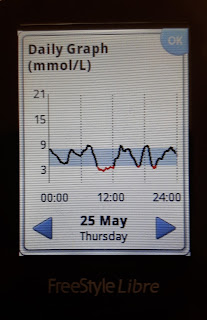A topical post which I will try to get up before this mini heatwave (end of May 2017) breaks.
I was spoilt for choice with titles based on songs about heat - could have been many from my Feeling Hot playlist, but Glenn Frey's 80s classic The Heat is On came first into my head.
This is a diabetes themed post, but before I get on to that, I can't resist making some general observations on our attitude to hot weather to see what others think.
It puzzles me that there's a collective assumption that hot weather is “good” weather. Weather forecasters - especially, dare I say, those whose qualification for the job appears to be based more on looks than on their meteorological expertise - tell us that temperatures are “good” when they just mean hot. Why do they assume we all love the heat? What about those who have to work in a stuffy office, factory or warehouse, exam candidates, hay fever sufferers, babies, old people, people in hospital, or anyone who just prefers to be comfortably warm rather than fried? What about animals? Even my hens were panting yesterday.
Rain is assumed to be a bad thing, but what about farmers and growers struggling to keep us fed, gardeners and groundsmen struggling to keep our parks beautiful and our sports pitches lush?
Don't get me wrong - I like the sunshine, I like warmth. But a heatwave? No thanks. My perfect temperature is around 20°C, and over 25°C makes me feel sleepy, sweaty, lethargic, thirsty - and as a result far from cheerful.
Peoples' response to, and behaviour in, hot weather here in Britain doesn't help either. The British have no idea how best to respond to heat, because it's a relative novelty. Our Mediterranean neighbours tend to slow down, dress in loose, cool clothing, cover themselves up and stay out of the sun, but the British throw off their clothing and expose themselves to the sun and all its harmful and potentially lethal effects. “Mad dogs and Englishmen” do indeed “go out in the midday sun”, and the alarming growth in skin cancer cases provides proof if it were needed.
Very few people of either gender look more attractive when wearing fewer clothes. I’m sorry, but most mens' chests and most womens' arms and legs look better when covered. And I include myself in that statement. Very few men look good in shorts, and when worn by the over 60s with socks and sandals – well just don't! Beyond the age of around forty, unless you're very lucky, you are very unlikely to look good with fewer clothes on. Time and again on a hot day, I see sights that make me just think “please, spare us”. And why do people think hot weather means you can inflict your choice of music on everyone else from your open window, your car or - God help us - your bluetooth outdoor speaker system?
Then there's diabetes. I put a poll on Twitter yesterday (25-05-17) to ask my fellow insulin users whether heat makes their blood sugar go high or low. I've had a good response, and around 75% say low, which certainly matches my experience. Here's a shot of it:-
Technically, I believe the reason is that insulin absorption rate is faster in hot temperatures, so for a given dose and carb intake, the hypo risk is greater. This was me yesterday, with my repeated need to compensate for falling BG clearly visible:-
Technically, I believe the reason is that insulin absorption rate is faster in hot temperatures, so for a given dose and carb intake, the hypo risk is greater. This was me yesterday, with my repeated need to compensate for falling BG clearly visible:-
But this, remember, is our fickle friend Type One Diabetes, so straightforward it isn't. Some people (25% of my sample) find that heat makes their BG go higher because they are less physically active in the heat, meaning that they need more insulin, not less. You can't win.
And there's another problem which I only noticed yesterday when one of my #T1D friends said late last night that she “felt high yet her BG was only 6”. Same with me, I thought, then I realised why. What's the main symptom of high blood glucose? Thirst. What's a symptom of being hot? Thirst. So if you've got diabetes and you feel tired and thirsty, you could be high, but it could just be the heat. Welcome to our world.
So when I hear forecasters speak of a “threat” of a thundery breakdown, to me it's a “promise”. I love the freshness after a storm, and I was delighted to see that next week's temperatures will be back to the high teens.
My perfect day is probably a fresh mellow sunny day in autumn, when the temperature rises to around 20, but falls to single figures at night. So please, don't tell me a heatwave is “good” weather. It may be good for some, but they are, I suspect, fewer in number than we are led to believe. Let me know if you agree, and if you don't, enjoy the heat, but spare a thought for those who don't.





